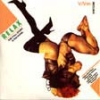 For V/VM this is love in the time of controversy, and it's especiallyfitting for them to be making some of the hottest music of theircareers while in the hottest water yet. After I obtained a copy of thisnow rare commodity through means I will not disclose — a process othersmight find difficult, as well — I immediately dimmed the lights andfired up the candles and twinkle lights to get in the right mood forthis revisiting of the Frankie Goes to Hollywood classic. Truth betold, I knew my body was about to be rocked, just not this hard and notwith so much of a history lesson involved. This being the 20thanniversary of the original release of "Relax," it seems V/VM wanted toshare some of the more interesting tidbits of the single's background,and some of the controversy that surrounded it, as well. Hence, theartwork that closely resembles the sleeve of the Frankie single, andsamples throughout the remixes of radio programmer reactions and otherstrangeness. As for the digital reconstruction that is the musicitself, I was floored by some of the showmanship involved. V/VM havegathered remixes from a number of manipulators, including Animal,Toecutter, Shitmat, The Alien Porno Midgets and more that succeed incapturing the essence of the track and then obliterating allconceptions about it. Several of the tracks don't even feature the wordthat is the song's title, cutting and splicing the bassline and choiceother phrases, creating a neo-stomp in pasting it all back together.There's odd combinations to be sure, but they work so well: the uses of"Auld Lang Syne" and "Smoke on the Water" are particularly noteworthyfor their originality and creation of an irreplaceable leitmotif in mybrain. Where other V/VM releases have seemed to pick apart and mock theartist in question, I felt that this was an earnest homage to theorginal and to the process of remixing in general. This is more of astatement than V/VM have ever made, and it hits on all levels; thusunintentionally they defy the issue that makes it difficult to find inthe first place, as well as those responsible for it.
For V/VM this is love in the time of controversy, and it's especiallyfitting for them to be making some of the hottest music of theircareers while in the hottest water yet. After I obtained a copy of thisnow rare commodity through means I will not disclose — a process othersmight find difficult, as well — I immediately dimmed the lights andfired up the candles and twinkle lights to get in the right mood forthis revisiting of the Frankie Goes to Hollywood classic. Truth betold, I knew my body was about to be rocked, just not this hard and notwith so much of a history lesson involved. This being the 20thanniversary of the original release of "Relax," it seems V/VM wanted toshare some of the more interesting tidbits of the single's background,and some of the controversy that surrounded it, as well. Hence, theartwork that closely resembles the sleeve of the Frankie single, andsamples throughout the remixes of radio programmer reactions and otherstrangeness. As for the digital reconstruction that is the musicitself, I was floored by some of the showmanship involved. V/VM havegathered remixes from a number of manipulators, including Animal,Toecutter, Shitmat, The Alien Porno Midgets and more that succeed incapturing the essence of the track and then obliterating allconceptions about it. Several of the tracks don't even feature the wordthat is the song's title, cutting and splicing the bassline and choiceother phrases, creating a neo-stomp in pasting it all back together.There's odd combinations to be sure, but they work so well: the uses of"Auld Lang Syne" and "Smoke on the Water" are particularly noteworthyfor their originality and creation of an irreplaceable leitmotif in mybrain. Where other V/VM releases have seemed to pick apart and mock theartist in question, I felt that this was an earnest homage to theorginal and to the process of remixing in general. This is more of astatement than V/VM have ever made, and it hits on all levels; thusunintentionally they defy the issue that makes it difficult to find inthe first place, as well as those responsible for it.
Two new shows just for you. We have squeezed out two extended release episodes for this weekend to get you through this week. They contain mostly new songs but there's also new issues from the vaults. The first show features music from Rider/Horse, Mint Field, Robert Aiki Aubrey Lowe, Anastasia Coope, ISAN, Stone Music, La Securite, Bark Psychosis, Jon Rose, Master Wilburn Burchette, Umberto, Wand, Tim Koh, Sun An, and Memory Drawings. The second episode has music by Laibach, Melt-Banana, Chuck Johnson, X, K. Yoshimatsu, Dorothy Carter, Pavel Milyakov, Violence Gratuite, Mark Templeton, Dummy, Endon, body / negative, Midwife, Alberto Boccardi, Divine. Cow in Maui from Veronika in Vienna. Get involved: subscribe, review, rate, share with your friends, send images! |



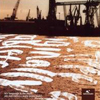 With her previous full-lengths, Head Slash Bauch and Westernization Completed,Antye Greie-Fuchs proved entirely capable of creating beautiful andunique electronic music without the help of her Laub bandmate Von Jotkaor frequent collaborator Vladislav Delay. Reaching an early peak onlast year's Westernization, AGF's mature style is both morechallenging than her past work and more rewarding. The increasinglyabstract free-association of Greie's characteristic speak-singing seemsto have found perfect accompaniment in a new loosening of songstructure which, instead of dissolving substance, allows for thecareful buttressing of her words with basic and unclutteredsound-forms, accentuating the language and aligning the music moreclosely with the power of suggestion. The "instrumental" portion ofAGF's music remains a recognizably laptop-based affair, full of crisp,bass-less beats, clean synth-like melodic lines, and a delicateunderpinning of digital drone and flutter; however on Westernization and to a greater degree on Language is the Most,these elements are treated with greater economy of use, layered lessfrequently or abundantly, and approached with more attention to varietyand improvisational flow. It's as if Greie treats instrumental soundlike it were part of her vocal, as if these melodic shards and openrhythms have assumed fixed places in the artist's advancing word bank,lent the same concise, charged delivery as her speech. This effect isconsistent with the broader theme of Language is the Most,essentially a live recording from AGF's performance at the ArsElectronica Festival's Klangpark in 2003. The theme of the festivallast year was "Code - The Language of Our Time," and it's hard toimagine an musician engaged in a more literal dialogue between digitalcode, musical composition, and spoken language than Antye Greie. Westernization is as much sound poetry as it is patient left-field electronica, and Languagemakes the distinction even more complicated. The live setup, by forceor by choice, has Greie's voice appearing with less regularity and lessreliance on structural cues, creating music whose success is largelyreliant on the tact of the artist's speech and the resonance of herwords taken alone. Her compositions progress along astream-of-consciousness logic, incorporating numerous field recordings,samples and organic-sounding clatter to make Language AGF'smost complex listen to date, despite the equally unprecedented amountof open space appearing throughout. Compounding the event's thematicinterest in coded language, text, and the relevancy of establishedcommunication methods, Greie incorporates pieces of Westernization, as good a document of the artist's own "language" as any, into her live set. This decision has ended up granting Languagesomething of a "companion piece"-status, and while I'd be more likelyto recommend the former to new listeners, the live disc has provided anequal amount of rapturous listening and contains the seeds of newrefinement in AGF's sound, making it just as essential.
With her previous full-lengths, Head Slash Bauch and Westernization Completed,Antye Greie-Fuchs proved entirely capable of creating beautiful andunique electronic music without the help of her Laub bandmate Von Jotkaor frequent collaborator Vladislav Delay. Reaching an early peak onlast year's Westernization, AGF's mature style is both morechallenging than her past work and more rewarding. The increasinglyabstract free-association of Greie's characteristic speak-singing seemsto have found perfect accompaniment in a new loosening of songstructure which, instead of dissolving substance, allows for thecareful buttressing of her words with basic and unclutteredsound-forms, accentuating the language and aligning the music moreclosely with the power of suggestion. The "instrumental" portion ofAGF's music remains a recognizably laptop-based affair, full of crisp,bass-less beats, clean synth-like melodic lines, and a delicateunderpinning of digital drone and flutter; however on Westernization and to a greater degree on Language is the Most,these elements are treated with greater economy of use, layered lessfrequently or abundantly, and approached with more attention to varietyand improvisational flow. It's as if Greie treats instrumental soundlike it were part of her vocal, as if these melodic shards and openrhythms have assumed fixed places in the artist's advancing word bank,lent the same concise, charged delivery as her speech. This effect isconsistent with the broader theme of Language is the Most,essentially a live recording from AGF's performance at the ArsElectronica Festival's Klangpark in 2003. The theme of the festivallast year was "Code - The Language of Our Time," and it's hard toimagine an musician engaged in a more literal dialogue between digitalcode, musical composition, and spoken language than Antye Greie. Westernization is as much sound poetry as it is patient left-field electronica, and Languagemakes the distinction even more complicated. The live setup, by forceor by choice, has Greie's voice appearing with less regularity and lessreliance on structural cues, creating music whose success is largelyreliant on the tact of the artist's speech and the resonance of herwords taken alone. Her compositions progress along astream-of-consciousness logic, incorporating numerous field recordings,samples and organic-sounding clatter to make Language AGF'smost complex listen to date, despite the equally unprecedented amountof open space appearing throughout. Compounding the event's thematicinterest in coded language, text, and the relevancy of establishedcommunication methods, Greie incorporates pieces of Westernization, as good a document of the artist's own "language" as any, into her live set. This decision has ended up granting Languagesomething of a "companion piece"-status, and while I'd be more likelyto recommend the former to new listeners, the live disc has provided anequal amount of rapturous listening and contains the seeds of newrefinement in AGF's sound, making it just as essential.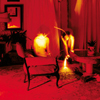 When feeling below the weather, this is the kind of sound that managesto pick me up and put me at peace. The cool, glass melodies andrainforest rhythms never cascade out of control leaving only the breezeand scent of spring in their wake. Calling "Über Die Wasserscheide" agentle ride might leave the impression that Cicadidaeis a simple record, but the masterful combination of live instrumentswith electronic moans is anything but that. Kammerflimmer Kollektiefhave an ear for space and fluidity — short tracks like "Blood" relate auniverse of thoughts and feelings in just over a minute while "...DennNacht Ist Jetzt Schon Bald!" unfolds in acoustic strips and wandering,mystical drum patterns. The weave of patterns andstream-of-consciousness noise-melodies play well with eachother, neverchoking out one another and never floundering in chaos; each second ofsound plays an important part in the song at just the right time. Denseor heavier moments always find themselves relieved in the caress of awoodwind instrument or the lazy kiss of a strummed guitar. "Sie TrankenRegen (Version)" ushers forth like cigarette smoke, slowly expandingthrough the room, tasting of memories, and shrouded in mystery — thedrumming pulsing from beneath a veil of jazz and the horns hover overthe lullaby of a lustful saxophone. The residue this record leavesbehind sticks to the walls and reverberates perpetually until finallyit seeps into the blood and animates the mind. Though melancholy findsits way onto the record, its the sort of sadness that only serves torejuvinate the soul and lift it back to its feet. As a little addedbonus, the latter portion of the record unfolds into a sultry dancethat can only be called sexy. Late-night excursions and secret thoughtscourse throughout "Mantra" and "Edierdaunen (Gerupft)." The variety ofcharacter that marks these songs stand out as one of the records beststrengths. There is a unique quality to the production,instrumentation, and arrangement of each tune that cannot beoverlooked.
When feeling below the weather, this is the kind of sound that managesto pick me up and put me at peace. The cool, glass melodies andrainforest rhythms never cascade out of control leaving only the breezeand scent of spring in their wake. Calling "Über Die Wasserscheide" agentle ride might leave the impression that Cicadidaeis a simple record, but the masterful combination of live instrumentswith electronic moans is anything but that. Kammerflimmer Kollektiefhave an ear for space and fluidity — short tracks like "Blood" relate auniverse of thoughts and feelings in just over a minute while "...DennNacht Ist Jetzt Schon Bald!" unfolds in acoustic strips and wandering,mystical drum patterns. The weave of patterns andstream-of-consciousness noise-melodies play well with eachother, neverchoking out one another and never floundering in chaos; each second ofsound plays an important part in the song at just the right time. Denseor heavier moments always find themselves relieved in the caress of awoodwind instrument or the lazy kiss of a strummed guitar. "Sie TrankenRegen (Version)" ushers forth like cigarette smoke, slowly expandingthrough the room, tasting of memories, and shrouded in mystery — thedrumming pulsing from beneath a veil of jazz and the horns hover overthe lullaby of a lustful saxophone. The residue this record leavesbehind sticks to the walls and reverberates perpetually until finallyit seeps into the blood and animates the mind. Though melancholy findsits way onto the record, its the sort of sadness that only serves torejuvinate the soul and lift it back to its feet. As a little addedbonus, the latter portion of the record unfolds into a sultry dancethat can only be called sexy. Late-night excursions and secret thoughtscourse throughout "Mantra" and "Edierdaunen (Gerupft)." The variety ofcharacter that marks these songs stand out as one of the records beststrengths. There is a unique quality to the production,instrumentation, and arrangement of each tune that cannot beoverlooked.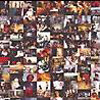 Those expecting Black Dice to travel further in the trajectory suggested by the beat-infused abrasiveness of Cone Toaster will no doubt be disappointed by Miles of Smiles. Black Dice's newest 12" on DFA is not very similar to the material on the aforementioned EP, and it doesn't share much in common with the blissful psychedelic clamor of their Beaches and Canyons album, either. It's something else entirely, an unexpected tangent into the realm of sampling and tape music.
Those expecting Black Dice to travel further in the trajectory suggested by the beat-infused abrasiveness of Cone Toaster will no doubt be disappointed by Miles of Smiles. Black Dice's newest 12" on DFA is not very similar to the material on the aforementioned EP, and it doesn't share much in common with the blissful psychedelic clamor of their Beaches and Canyons album, either. It's something else entirely, an unexpected tangent into the realm of sampling and tape music. This is the third DVD released on Alan Bishop's Sublime Frequencies imprint, and it offers a rare glimpse at the traditional music and ceremonies of the Tuareg people of Libya. The Tuareg are an ancient desert-dwelling people who have never been subsumed into the Arab/Muslim majority of the rest of the Middle East.
This is the third DVD released on Alan Bishop's Sublime Frequencies imprint, and it offers a rare glimpse at the traditional music and ceremonies of the Tuareg people of Libya. The Tuareg are an ancient desert-dwelling people who have never been subsumed into the Arab/Muslim majority of the rest of the Middle East.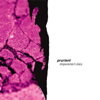 Newest addition to the most sparsely-populated of Ground Fault's threeseries headings (series III, the "harsh noise" category), Shipwrecker's Diarycertainly justifies its placement. Providence's Prurient (aka DominickFernow) is a learned student in the brutal school of power electronics,but one whose intentions lie more in the head-cleaning, catharticcorner of the genre than in the kind sensationalism practiced by othernotables like Deathpile, who has recorded for Fernow's own HospitalProductions. The noise on Shipwrecker's tends to occupy ahigh-frequency range with layers of crisp static making a thick cushionfor most of the other activity and keeping the whole from sinking intothe doom-y sludge that is a popular pitfall for others working in thismedium. No sounds reach truly cringe-inducing, spectrum-piercinglevels, making the disc highly listenable following a short adjustmentperiod. Once inside, there's enough nuance and careful construction tomake for a very rewarding noise record. It's clear that Fernow favorsnot the guttural thrash of people like Deathpile or the explicit,confrontational side of the genre, as embodied (still) by Whitehouse.Instead, he works with less-concentrated, incremental noise, usingspeed and a more gradual, swarming approach to achieve his desiredeffect, which is every bit as powerful as his peers' though less likelyto get bogged down in bad posturing. It's interesting to try and dividethe 33-minute Shipwrecker's into two conceptual halves. Thefirst eight tracks offer the disc's grittiest noise, crumbling staticwaves and washes that develop patiently enough to sound almost capableof being touched or traced with the hand. This is unrelenting, physicalnoise, and Fernow knows it, naming each track after a part of the body,starting with "Shin" and moving up to "Elbow." There is, despite thesheer mass of sound bombarding the ears, a level of comfort availablein the "material" quality of the noise during this half. However with"June 19," Prurient moves on, breaking the connection with the body andallowing the sound to bottom out considerably, leaving only a scorchedwhine and weighted hiss, allying him more with the current crop ofMidwestern homemade noisemakers than with the stoic "power" camp.Following the track's interlude, Fernow's familiar face returns for thedisc's most harrowing section, a 4-track blitzkrieg run through wildlypunctuated bursts, quickly modulated pitch shifts and blasted vocalyelps. For titles, the artist returns to the body, but is now localizedat the head ("Earlobe," "Jaw"), suggesting to me that, from the basephysicality of Shipwrecker's first half, Prurient has moved nowto a site of deeper mental anguish, hence the obsession with the headand the tortured quality of the music in the latter half. In myunderstanding, "June 19" arrives midway as bitter introduction to theworld of the mind, like a repressed memory, foregrounding the nakedemotion that arrives with the disc's closing tracks, two unalteredanswering machine messages left by a young girl. They are late-nightlove messages, innocent, tender, and certainly in contrast with thehellish vision that preceded them. And while some may find Fernow'sconclusion too "neat" or explicit as a thematic rendering, these tracksdo help establish what was suspected before, that Prurient is, atleast, one of the more introspective or "personal" noise artistsworking today, if not the kinder, gentler new face of powerelectronics.
Newest addition to the most sparsely-populated of Ground Fault's threeseries headings (series III, the "harsh noise" category), Shipwrecker's Diarycertainly justifies its placement. Providence's Prurient (aka DominickFernow) is a learned student in the brutal school of power electronics,but one whose intentions lie more in the head-cleaning, catharticcorner of the genre than in the kind sensationalism practiced by othernotables like Deathpile, who has recorded for Fernow's own HospitalProductions. The noise on Shipwrecker's tends to occupy ahigh-frequency range with layers of crisp static making a thick cushionfor most of the other activity and keeping the whole from sinking intothe doom-y sludge that is a popular pitfall for others working in thismedium. No sounds reach truly cringe-inducing, spectrum-piercinglevels, making the disc highly listenable following a short adjustmentperiod. Once inside, there's enough nuance and careful construction tomake for a very rewarding noise record. It's clear that Fernow favorsnot the guttural thrash of people like Deathpile or the explicit,confrontational side of the genre, as embodied (still) by Whitehouse.Instead, he works with less-concentrated, incremental noise, usingspeed and a more gradual, swarming approach to achieve his desiredeffect, which is every bit as powerful as his peers' though less likelyto get bogged down in bad posturing. It's interesting to try and dividethe 33-minute Shipwrecker's into two conceptual halves. Thefirst eight tracks offer the disc's grittiest noise, crumbling staticwaves and washes that develop patiently enough to sound almost capableof being touched or traced with the hand. This is unrelenting, physicalnoise, and Fernow knows it, naming each track after a part of the body,starting with "Shin" and moving up to "Elbow." There is, despite thesheer mass of sound bombarding the ears, a level of comfort availablein the "material" quality of the noise during this half. However with"June 19," Prurient moves on, breaking the connection with the body andallowing the sound to bottom out considerably, leaving only a scorchedwhine and weighted hiss, allying him more with the current crop ofMidwestern homemade noisemakers than with the stoic "power" camp.Following the track's interlude, Fernow's familiar face returns for thedisc's most harrowing section, a 4-track blitzkrieg run through wildlypunctuated bursts, quickly modulated pitch shifts and blasted vocalyelps. For titles, the artist returns to the body, but is now localizedat the head ("Earlobe," "Jaw"), suggesting to me that, from the basephysicality of Shipwrecker's first half, Prurient has moved nowto a site of deeper mental anguish, hence the obsession with the headand the tortured quality of the music in the latter half. In myunderstanding, "June 19" arrives midway as bitter introduction to theworld of the mind, like a repressed memory, foregrounding the nakedemotion that arrives with the disc's closing tracks, two unalteredanswering machine messages left by a young girl. They are late-nightlove messages, innocent, tender, and certainly in contrast with thehellish vision that preceded them. And while some may find Fernow'sconclusion too "neat" or explicit as a thematic rendering, these tracksdo help establish what was suspected before, that Prurient is, atleast, one of the more introspective or "personal" noise artistsworking today, if not the kinder, gentler new face of powerelectronics.  "Celestial Highway" is a massive, stomping heavy metal riff, a bighairy acid-drenched slab of fuzzy blues cribbed from the Blue Cheerhandbook. The jacked-up shredding that twists around the centralrhythmic stomp is directly inspired by the third-eye Satanic soloing ofGlenn Tipton and Tony Iommi. That shit keeps cycling around, pulsatingfuzzy tendrils of bombastic riffage, hairy to the Nth degree, liftingup to the clouds on a silver machine of over-amped guitar wreckage. Andthen it repeats. Over and over. For nearly an hour. Matthew Bower'snewest album under the Skullflower banner earns its title. Not for thepatience-challenged, Exquisite Fucking Boredomtests the limits of repetition. Applying the techniques of theavant-garde repetitive techniques of Steve Reich and Terry Riley tonoisy psych-rock has been tried before, most memorably on Acid MothersTemple's reading of Riley's monumental In C. But I must confessthat Bower has done them one better with the four-part suite of"Celestial Highway," which sets a new record for trance-rock. Even moreexasperating that Spinal Tap's wanky Jazz Odyssey, Skullfloweris pushing the envelope of acceptability in terms of musical content. Ithink it pays off brilliantly, but whether or not the average listenerwill agree depends upon their temperament. The nuanced production is byColin Potter, the genius engineer and producer behind some of NurseWith Wound's best work. Potter's technique is to add sheets ofcompounding noise run-off to each successive riff, alternately buryingthe cyclical guitars in a pile of audio rubble, or uncovering andhighlighting them by pushing out the borders of distortion. It's notfor the faint of heart, but over the course of the album, it ascends toa hypnotic level of transcendence. Like a lot of ethnic and avant-gardetrance music, the eventual goal is for the listener to ignore thecentral repeating theme, which fades like white noise to thebackground, focusing instead on the gradual evolution of sound, or inthe case of Skullflower's album, the compounding noise, distortion anddecay that creep in over the course of the four-part suite. Patience isa virtue, and in the case of Exquisite Fucking Boredom, it's avirtue that eventually rewards the listener with some of the mostbizarre and unconventional "stoner rock" yet conceived.
"Celestial Highway" is a massive, stomping heavy metal riff, a bighairy acid-drenched slab of fuzzy blues cribbed from the Blue Cheerhandbook. The jacked-up shredding that twists around the centralrhythmic stomp is directly inspired by the third-eye Satanic soloing ofGlenn Tipton and Tony Iommi. That shit keeps cycling around, pulsatingfuzzy tendrils of bombastic riffage, hairy to the Nth degree, liftingup to the clouds on a silver machine of over-amped guitar wreckage. Andthen it repeats. Over and over. For nearly an hour. Matthew Bower'snewest album under the Skullflower banner earns its title. Not for thepatience-challenged, Exquisite Fucking Boredomtests the limits of repetition. Applying the techniques of theavant-garde repetitive techniques of Steve Reich and Terry Riley tonoisy psych-rock has been tried before, most memorably on Acid MothersTemple's reading of Riley's monumental In C. But I must confessthat Bower has done them one better with the four-part suite of"Celestial Highway," which sets a new record for trance-rock. Even moreexasperating that Spinal Tap's wanky Jazz Odyssey, Skullfloweris pushing the envelope of acceptability in terms of musical content. Ithink it pays off brilliantly, but whether or not the average listenerwill agree depends upon their temperament. The nuanced production is byColin Potter, the genius engineer and producer behind some of NurseWith Wound's best work. Potter's technique is to add sheets ofcompounding noise run-off to each successive riff, alternately buryingthe cyclical guitars in a pile of audio rubble, or uncovering andhighlighting them by pushing out the borders of distortion. It's notfor the faint of heart, but over the course of the album, it ascends toa hypnotic level of transcendence. Like a lot of ethnic and avant-gardetrance music, the eventual goal is for the listener to ignore thecentral repeating theme, which fades like white noise to thebackground, focusing instead on the gradual evolution of sound, or inthe case of Skullflower's album, the compounding noise, distortion anddecay that creep in over the course of the four-part suite. Patience isa virtue, and in the case of Exquisite Fucking Boredom, it's avirtue that eventually rewards the listener with some of the mostbizarre and unconventional "stoner rock" yet conceived.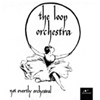 The first interesting thing about Not Overtly Orchestralis the black-and-white photo on back of the disc, framing tworeel-to-reel tape decks, fastened to a bare wall about 20 feet apartand running a visibly stretched loop of tape across the expanse.Whether or not the six members of The Loop Orchestra actually performusing loops this large does not determine the success of their music;however, a healthy love of loops, odd juxtapositions, distortedlayerings, and nostalgia might create the perfect predisposition. LoopOrchestra are from Australia, with members who've played in theoft-overlooked experimental/industrial/newwave outfit Severed Heads,and like that band's more challenging 12" platters, Not Overtly Orchestralis heavy on clipped, semi-nauseous repetitions, loops meant to definethemselves as loops first and foremost, with any mood-making orillusionism purely secondary. The Orchestra work exclusively withreel-to-reel decks, a process that all but guarantees their primitivetechnique, by which various loops are slowly layered, fading in and outto create tracks that progress (depending on tact and intention) in ausually fluid, ever-changing fashion. While they lack most of theHeads' mechanical rigidity and long-windedness, Loop Orchestra'sslippery sense of humor and interest in all things arcane andincompatible seems directly related to their fellow countrymen. I amhesitant to compare this disc to other loop-centric, antiquatedtechnologists like (the now obvious) Philip Jeck because the appealhere feels more esoteric, more heavily reliant on the kitsch factor.Tape-loop composition is a tried, age-old technique, making The LoopOrchestra worthy of praise mainly because of the increasingly bizarrenature of the sounds used. The opening "Son of Not Overtly Orchestra"establishes its initial mood with a choir of hazy stringed instrumentswhich are slowly and nervously assimilated into a factory noisescape,eventually locking into submission as a few wailing guitars initiatethe track's calamitous end. The track acts as a pleasant preamble tothe weirdness that will dominate the rest of the disc. "Radiophony" isa 15-minute piece created from, and in tribute to, the BBC RadiophonicWorkshop's archival recordings. The Orchestra approaches this sourcematerial the way Stock, Hausen, & Walkman might, isolating thestrangest of the Workshop's creations, from abstract animal voices towonderfully dated space-age trumpet sounds and a library's worth ofgrainy, analogue atmospherics, stretching and piling each bit of tapeinto a surreal tour-de-force that those bearded Brits could never havedreamed up. The disc's real gem, though, is "Profiles," the longest ofthe four pieces and one that clarifies the Orchestra's devotion to campand all things peculiar. It is a vast collage of vocal sounds, rangingfrom piercing screams to breathy grunts and warped speech, piecedtogether in a staggering, drug-damaged spew, rife with churning aquaticnoise and other field captures. The track is a perfect summation of thegroup's interests, further into leftfield than they initially appearand completely capable of breathing freshness into tired styles andobsolete devices.
The first interesting thing about Not Overtly Orchestralis the black-and-white photo on back of the disc, framing tworeel-to-reel tape decks, fastened to a bare wall about 20 feet apartand running a visibly stretched loop of tape across the expanse.Whether or not the six members of The Loop Orchestra actually performusing loops this large does not determine the success of their music;however, a healthy love of loops, odd juxtapositions, distortedlayerings, and nostalgia might create the perfect predisposition. LoopOrchestra are from Australia, with members who've played in theoft-overlooked experimental/industrial/newwave outfit Severed Heads,and like that band's more challenging 12" platters, Not Overtly Orchestralis heavy on clipped, semi-nauseous repetitions, loops meant to definethemselves as loops first and foremost, with any mood-making orillusionism purely secondary. The Orchestra work exclusively withreel-to-reel decks, a process that all but guarantees their primitivetechnique, by which various loops are slowly layered, fading in and outto create tracks that progress (depending on tact and intention) in ausually fluid, ever-changing fashion. While they lack most of theHeads' mechanical rigidity and long-windedness, Loop Orchestra'sslippery sense of humor and interest in all things arcane andincompatible seems directly related to their fellow countrymen. I amhesitant to compare this disc to other loop-centric, antiquatedtechnologists like (the now obvious) Philip Jeck because the appealhere feels more esoteric, more heavily reliant on the kitsch factor.Tape-loop composition is a tried, age-old technique, making The LoopOrchestra worthy of praise mainly because of the increasingly bizarrenature of the sounds used. The opening "Son of Not Overtly Orchestra"establishes its initial mood with a choir of hazy stringed instrumentswhich are slowly and nervously assimilated into a factory noisescape,eventually locking into submission as a few wailing guitars initiatethe track's calamitous end. The track acts as a pleasant preamble tothe weirdness that will dominate the rest of the disc. "Radiophony" isa 15-minute piece created from, and in tribute to, the BBC RadiophonicWorkshop's archival recordings. The Orchestra approaches this sourcematerial the way Stock, Hausen, & Walkman might, isolating thestrangest of the Workshop's creations, from abstract animal voices towonderfully dated space-age trumpet sounds and a library's worth ofgrainy, analogue atmospherics, stretching and piling each bit of tapeinto a surreal tour-de-force that those bearded Brits could never havedreamed up. The disc's real gem, though, is "Profiles," the longest ofthe four pieces and one that clarifies the Orchestra's devotion to campand all things peculiar. It is a vast collage of vocal sounds, rangingfrom piercing screams to breathy grunts and warped speech, piecedtogether in a staggering, drug-damaged spew, rife with churning aquaticnoise and other field captures. The track is a perfect summation of thegroup's interests, further into leftfield than they initially appearand completely capable of breathing freshness into tired styles andobsolete devices.  Two former members of Arab Strap strike out on their own as Sons andDaughters, and if their debut is any indication they'll be just finefrom here on out. Adele Bethel and David Gow are not necessarilywell-known for their time touring with the Strap, but with theirfriends and bandmates they craft their own brand ofcountry/folk/blues/rock romp and stomp that's just quirky enough tokeep me coming back for more. With other singer and guitar player ScottPaterson, Bethel makes rather lovely harmonies over tunes that varyfrom all-out bombastic knee-slappers to tributes to Johnny Cash. It'stantamount to the best bar band I've heard in my life, where I'd be aregular singing along to all the songs, cursing the tourists who don'tknow what glory they're talking through. That's not to diminish theirskills any, as any bar would be lucky to have an ensemble like thisin-house. From the outset, I was ready to dance and shake with a beerin one hand and a girly in the other, as the steady rhythm of "Fight"has all the feel of a do-si-do gone wrong. "The lines are drawn, thisis getting worse" immediately precedes a call-out of "Uh huh uh huh,"and it's destined for call and response at any show. Bethel has a liltin her voice that just beckons, but there's always a hint of somethingmuch more that can be unleashed at any moment. Paterson, then, is theperfect foil, all accented awkward thuds but still perfectly suited tothe sounds beneath. It's the frenetic energy, that hesitation of what'snext, that brings about the real power in this band. The tempos of thesongs are very similar, but they take off in wildly differentdirections, so it's of no concern. Just like that, though, the recordis over: it's seven songs of easy aggression and power harmonies, andhooks in my head for days.
Two former members of Arab Strap strike out on their own as Sons andDaughters, and if their debut is any indication they'll be just finefrom here on out. Adele Bethel and David Gow are not necessarilywell-known for their time touring with the Strap, but with theirfriends and bandmates they craft their own brand ofcountry/folk/blues/rock romp and stomp that's just quirky enough tokeep me coming back for more. With other singer and guitar player ScottPaterson, Bethel makes rather lovely harmonies over tunes that varyfrom all-out bombastic knee-slappers to tributes to Johnny Cash. It'stantamount to the best bar band I've heard in my life, where I'd be aregular singing along to all the songs, cursing the tourists who don'tknow what glory they're talking through. That's not to diminish theirskills any, as any bar would be lucky to have an ensemble like thisin-house. From the outset, I was ready to dance and shake with a beerin one hand and a girly in the other, as the steady rhythm of "Fight"has all the feel of a do-si-do gone wrong. "The lines are drawn, thisis getting worse" immediately precedes a call-out of "Uh huh uh huh,"and it's destined for call and response at any show. Bethel has a liltin her voice that just beckons, but there's always a hint of somethingmuch more that can be unleashed at any moment. Paterson, then, is theperfect foil, all accented awkward thuds but still perfectly suited tothe sounds beneath. It's the frenetic energy, that hesitation of what'snext, that brings about the real power in this band. The tempos of thesongs are very similar, but they take off in wildly differentdirections, so it's of no concern. Just like that, though, the recordis over: it's seven songs of easy aggression and power harmonies, andhooks in my head for days.
